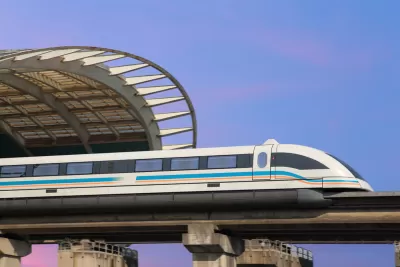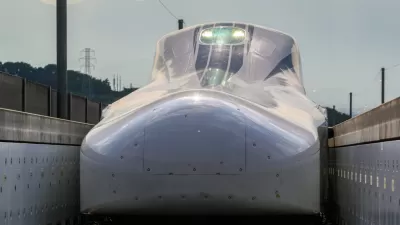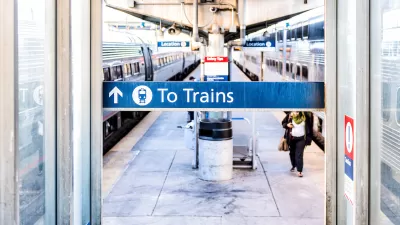The Federal Railroad Administration recently released a preliminary study of a proposed high-speed maglev train route between Baltimore and Washington, D.C.

The Federal Railroad Administration in January released a preliminary review of a proposal to build a high-speed maglev train system between Baltimore and Washington, D.C. as the first leg of a route that would eventually connect to New York City, reports Luz Lazo.
The preliminary review "[lays] out potential routes, as well as economic and environmental impacts of the train service that would move passengers between the nation’s capital and Baltimore in 15 minutes," according to Lazo.
The preliminary study considers two potential alignments, both running parallel to the Baltimore-Washington Parkway. Lazo provides more details on each of the potential alignments in the source article.
The project is estimated to cost between $13.8 billion and $16.8 billion, depending on alignment chosen. The costs has been rising. "Northeast Maglev, the private investors behind the project, had pegged costs at $10 billion to $12 billion. " Northeast Maglev has announced $5 billion in funding for the project from Japan.
According to Lazo, the project is facing stiff opposition from "residents, civic associations and elected officials in the project’s path." The federal study has already been delayed by a year.
Hat tip to Sandy Smith for sharing the Washington Post article.
FULL STORY: Federal review of Baltimore-Washington high-speed maglev project moves ahead

Planetizen Federal Action Tracker
A weekly monitor of how Trump’s orders and actions are impacting planners and planning in America.

Restaurant Patios Were a Pandemic Win — Why Were They so Hard to Keep?
Social distancing requirements and changes in travel patterns prompted cities to pilot new uses for street and sidewalk space. Then it got complicated.

Maui's Vacation Rental Debate Turns Ugly
Verbal attacks, misinformation campaigns and fistfights plague a high-stakes debate to convert thousands of vacation rentals into long-term housing.

In California Battle of Housing vs. Environment, Housing Just Won
A new state law significantly limits the power of CEQA, an environmental review law that served as a powerful tool for blocking new development.

Boulder Eliminates Parking Minimums Citywide
Officials estimate the cost of building a single underground parking space at up to $100,000.

Orange County, Florida Adopts Largest US “Sprawl Repair” Code
The ‘Orange Code’ seeks to rectify decades of sprawl-inducing, car-oriented development.
Urban Design for Planners 1: Software Tools
This six-course series explores essential urban design concepts using open source software and equips planners with the tools they need to participate fully in the urban design process.
Planning for Universal Design
Learn the tools for implementing Universal Design in planning regulations.
Heyer Gruel & Associates PA
JM Goldson LLC
Custer County Colorado
City of Camden Redevelopment Agency
City of Astoria
Transportation Research & Education Center (TREC) at Portland State University
Camden Redevelopment Agency
City of Claremont
Municipality of Princeton (NJ)





























